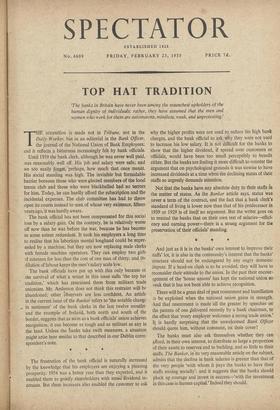TOP HAT TRADITION
'The banks in Britain have never been among the staunchest upholders of the human dignity of individuals; rather, they have assumed that the men and women who work for them are automatons, mindless, weak, and unprotesting.'
THE accusation is made not in Tribune, not in the Daily Worker, but in an editorial in the Bank Officer, the journal of the National Union of Bank Employees; and it reflects a bitterness increasingly felt by bank officials.
Until 1939 the bank clerk, although he was never well paid, was reasonably well off. His job and salary were safe; and we tdo easily forget, perhaps, how much that once meant. His social standing was high. The invisible but formidable barrier between those who were elected members of the local tennis club and those who were blackballed had no terrors for him. Today, he can hardly afford the subscription and the incidental expenses. The club committee has had to throw open its courts instead to men of whose very existence, fifteen years ago, it was hardly aware.
The bank official has not been compensated for this social loss by a salary gain. On the contrary, he is relatively worse off now than he was before the war, because he has become to some extent redundant. It took his employers a long time to realise that his laborious mental longhand could be super- seded by a machine; but they are now replacing male clerks with female machine operators. They can employ two girls of nineteen for less than the cost of one man of thirty; and the dilution of labour keeps the men's salary scale low.
The bank officials have put up with this only because of the survival of what a writer in this issue calls 'the top hat tradition,' which has restrained them from militant trade unionism. Mr. Anderson does not think this restraint will be abandoned; other Observers are less confident. An article in the current issue of the Banker refers to 'the notable change . in sentiment' of the bank clerks in the last twelve months: and the example of Ireland, both north and south of the border, suggests that as soon as a bank officials' union achieves recognition, it can become as tough and as militant as any in the land. Unless the banks take swift measures, a situation might arise here similar to that described in ,our Dublin corre- spondent's note. why the higher profits were not used to reduce his high bank charges, and the bank official to ask why they were not used to increase his low salary. It is not difficult for the banks to show that the higher dividend, if spread over customers or officials, would have been too small perceptibly to benefit either. But the banks are finding it more difficult to counter the argument that on psychological grounds it was unwise to have increased dividends at a time when the declining status of their staffs so urgently demands attention.
Not that the banks have any absolute duty to their staffs in the matter of status. As the Banker article says, status was never a term of the contract, and the fact that a bank clerk's standard of living is lower now than that of his predecessor in 1939 or 1929 is of itself no argument. But the writer goes on to remind the banks that on their own test of salaries—effici- ency and earning power—there is a strong argument for the preservation of their officials' standing.
* • And just as it is in the banks' own interest to improve their staffs' lot, it is also in the community's interest that the banks' itructure should not be endangered by any angry domestic dispute. If a head-on clash is to be avoided, they will have to reconsider their attitude to the union. In the past their encour- agement of the 'house unions' has kept the national union so veak that it has not been able to achieve recognition.
There will be a great deal of past resentment and humiliation .o be exploited when the national union gains in strength. And that resentment is made all the greater by speeches on the pattern of one delivered recently by a bank chairman, to the effect that 'every employer welcomes a strong trade union.' It is hardly surprising that the unwelcomed Bank Officer should quote him, without comment, on their cover!
The banks must also ask themselves whether they can afford, in their own interest, to distribute so large a proportion of their assets to reserves and to building, and so little to their staffs. The Banker, in its very reasonable article on the subject. admits that the decline in bank salaries is greater than that of the very people 'with whom it pays the banks to have their staffs mixing socially'; and it suggests that the banks should pluck up courage and invest in success—`with the investment in this case in human capital.' Indeed they should.










































 Previous page
Previous page